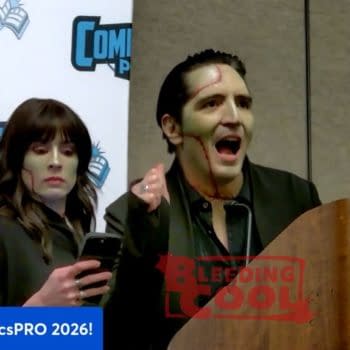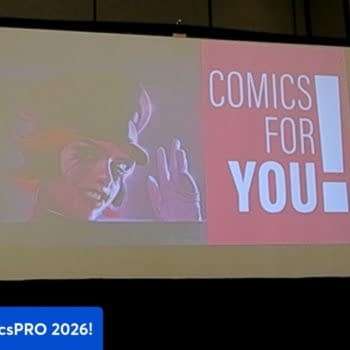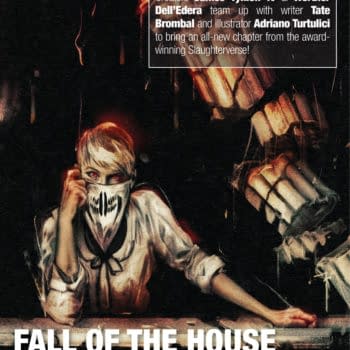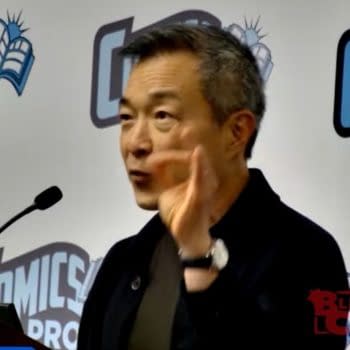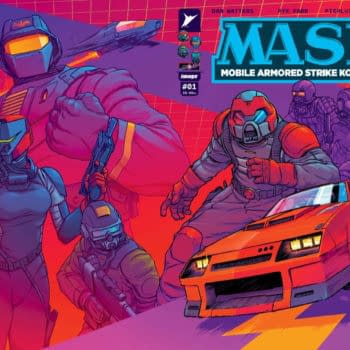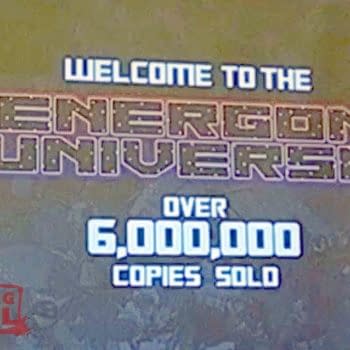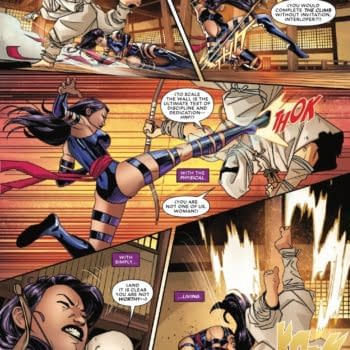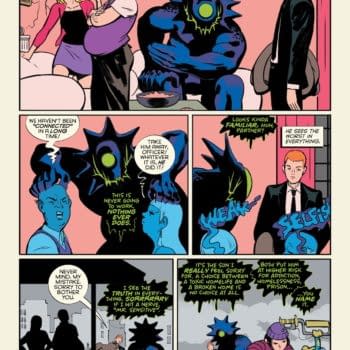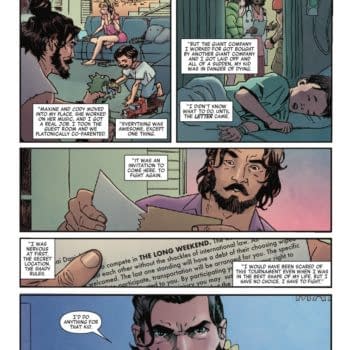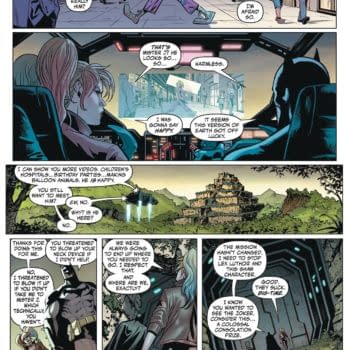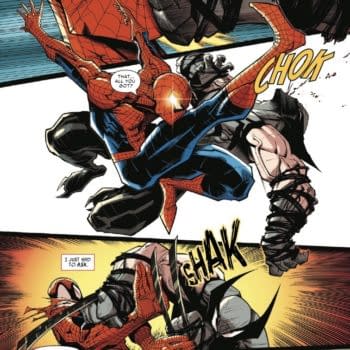Posted in: Comics | Tagged: Comics, concrete park, dark horse, Erika Alexander, racism
Actress Erika Alexander Overcomes Hollywood Racism To Build Concrete Park On Dark Horse's Block
Erika Alexander believes in our power to shape our own futures, a mindset she applies to her own life with inner strength and passion. The actress, most famous for playing eccentric, strong-willed attorney Maxine Shaw on the 90s sitcom Living Single, is also co-creator of Concrete Park, a gritty science fiction series that was serialized in multiple Dark Horse Presents issues beginning with #7 in December 2011. Thanks to strong critical buzz, Dark Horse has greenlit a Concrete Park five-issue miniseries to go on sale in 2014.
Alexander's overcome huge obstacles to have her story told in comic book form, and her conviction and persistence is admirable. More than 10 years ago, she and collaborators Tony Puryear (Eraser), her screenwriter husband, and her brother Robert Alexander pitched Hollywood a science fiction film with a predominantly black cast, and a studio executive wanted to change the race of the characters. Puryear quoted the executive at a Comic-Con panel in 2012, who said, "black people don't like science fiction — they don't see themselves in the future." Those words shocked the creators, but they didn't break their spirits.
They spent years strategizing and adapted their story for comics, which led to Concrete Park's creation. In the series, the overcrowded, future Earth ships poor youth to the planet Oasis to mine for resources, but the name "Oasis" is misleading. Nothing grows there, resources are scarce, and no one can get pregnant. The exiles join violent gangs amid an aura of hopeless and despair. The series explores tribalism, transformation, and the struggle for people to create meaningful lives in world without hope.
This tale of redemption aims to deconstruct racial stereotypes, and its sophisticated storytelling prompted Houghton Mifflin Harcourt to deem it one of The Best American Comics of 2013.
Alexander spoke to Bleeding Cool in this Q&A about the story, its characters, and her thoughts on racism and tribalism in Hollywood and America.
Erika: Tony draws it and letters it. It's a family business, and I co-write with him. My brother was responsible for coming with the initial sort of spark and ingredients with me, but it's been a long haul.
Hilton: Did the executive's words about your pitch surprise you? How did it feel to hear that?
Erika: [laughs] We were very surprised. We were actually shocked by his blatant racism. It wasn't just that he said that black people wouldn't like it. His assumption was that you're only making it for black people, so that's the problem. You have people, they give themselves the tag of white Hollywood liberals, and they can often be some of the most racist people you've ever met.
Hilton:You were on a panel at San Diego Comic-Con 2013. How did that go?
Erika: it was excellent. We were at Brandon Easton's panel and it was the best panel I'd ever been on or invited to. I was actually taking notes like I was in the audience. He really had some really wonderful speakers. The line was really long because we gave a nice limited edition poster. People who were in the line went back to buy the comic and have us sign.
Hilton: You launched Concrete Park as a comic book in response to what happened when you tried to pitch it as a film, is that correct?
Erika: We decided to establish it in a form that maybe had lesser restrictions, and we could fully sort of explore what that would be.
Hilton: By re-imagine, what do you mean? The way you told the story or do you mean other things, like the storyline decisions that you made?
Erika: Both. We were trying to make a TV show and a film, there's no doubt about it, but once we decided to make it a comic, we really had to say, 'Ok, so how can we be the best comic we can be?' In order to be respected, we had to respect the art form itself. Tony's a comic book reader. I had been getting into comic books through him. He knew the types of things he liked, but he was also intimidated by the art form itself. He's been a screenwriter his whole life, and he always said, 'I write pictures.' You think about film in pictures, not necessarily in dialogue.
Hilton: Where did this story come from? You could have put it in the modern world, you could have put it maybe back in time, but you chose the future.
Erika: We knew it was going to be in the future. We were very influenced by City of God, a film that we loved, so we knew we wanted to be in a very, for lack of a better word, urban setting, but we knew we [had to] take it off Earth because of the stereotypes here of people of color or people who are poverty-based, despite that studio exec saying black people don't see themselves in the future. Black people have ALWAYS seen themselves in the future. We've always created a new future because it's been very difficult for us to survive and be realized in the present.
Hilton: What are you trying to make the audience see with this story?
Erika: This is a small story and we're trying to tell it in an epic way. It's a story that should be recognizable here on earth right now because we all know that science fiction is in the future but talks about issues we're dealing with now. One of the issues we're dealing with now is the limited resources we have on Earth, the dying Earth that they keep saying is going to die because of our wastefulness and our tribalism and our lack of connection with nature and the fact that we are animals with limited resources.
That's partly the set-up underlying Concrete Park. Concrete Park is a mystery in itself. They live in a place called Scare City because everything's so scary, and everything's so frickin' scarce. It's straight out of Jack Kirby or Stan Lee. The planet is called Oasis, but again, that's a lie because nothing grows there. There's no water, everything's down in the planet, and they're mining ice and sending it back, but they have no access to it. When they get up there, they have a question to answer: Will they continue the violence and tribalism that they learned on Earth, or will they make something new? And by the way, on that planet, they are the aliens. Where did the original inhabitants go?
Hilton: That sounds like enough content for multiple miniseries.
Erika: [laughs] I'm so glad you recognize that. When our publisher told us five books at 22, I looked at them like they were out of their minds. I said, 'I thought more Game of Thrones, y'all.' I have a feeling that we're going to do the basic core of the story and then see how well it does. Then it will spin off and we'll see how everything is defined, but brother, I have no idea.
Hilton: Well, you could just do it as a group of miniseries', with the first set of five being Book I, or something like that. Is that something that Dark Horse isn't sold on?
Erika: Again, it all depends on how well it does. The problem is, what part of that story do we tell? What part is relevant enough to hook you but not linger on? We know how much you can do in two hours in a movie, so I think it's going to be something where you might see its movie version in comic book form because we don't have a lot of time.
Hilton: There's a venerable criticism of media that representations of people of color aren't positive enough, and that the characters should be admirable, upstanding citizens. But you have all these ethnic people in your story who are in gangs.
Erika: Well, you've had that criticism before. I'll be very clear with people that I appreciate it but they don't know what they're talking about. They really have limited versions of what black people or people of color have been. I understand they might look at this and say, 'Oh, we need a more uplifting thing, doctors and lawyers,' but that's absurd. What we need are full characters, wholly complex. Everybody's in a gang, I always say. Republicans are a gang. Libertarians are a gang. So are the Democrats.
We identify ourselves in groups. Gangs do it, and they run the streets and because they use violence. They are definitely "the other." They're definitely outside of the mainstream, but you could be also military and do huge amounts of violence all over the world in the name or under the flag of your team. Human beings are tribal. We are always identified by our groups.
I appreciate the criticism, yet I reject it.. We have no problem seeing Matt Damon in Elysium. The minute you put a black person in Elysium, they think, 'Is it a black movie now?' As if, to be a whole person in a fully realized world, you have to be white. I find it absurd. Unless you're Will Smith or Denzel [Washington]. Those two are immune.
In our world, you see the world as it truly is, populated by mostly brown, black, yellow and red, and there are white people there, and they're going to have a place, but most of them, in the end, will not ever be defined by their race, at least not their color. They're the human race against the people who own that planet, but they'll all have to learn to work together in order to live.









